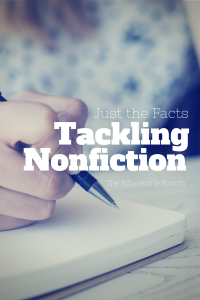 I show my class a book about whales. We are beginning a science unit on these fascinating creatures and I am using language arts to support it. I selected the book to start the unit carefully. It had to have compelling pictures with captions and text that would be challenging for them yet intriguing enough to hold their interest. I also wanted it to have a table of contents and an index as I want to teach those skills. The story, also, needed to be clearly nonfiction.
I show my class a book about whales. We are beginning a science unit on these fascinating creatures and I am using language arts to support it. I selected the book to start the unit carefully. It had to have compelling pictures with captions and text that would be challenging for them yet intriguing enough to hold their interest. I also wanted it to have a table of contents and an index as I want to teach those skills. The story, also, needed to be clearly nonfiction.
Before we begin, I ask the class to tell me what they know about whales. The students percolate a wide range of facts about whales, some right, some wrong. Each idea is put on chart paper. I keep the chart next to me and I begin to read the book. It is titled “Whale Facts.”
As we move through the book, the children are encouraged to suggest additions to the whale facts list. We also correct errors. The first thing to go is “Whales are fish.” It takes time to keep stopping to build and fix the list. Non-fictions books, generally, take longer to read than fiction does. Often, it will take a couple of sittings to finish the book, especially, if we are writing responses to it.
After we finish the book, the chart will be taped at their height so it is accessible to them. Each time we read a new story about whales, we add more facts to our chart. It gets positively messy with learning. They come to me with facts from their own reading, written on scraps of paper. We correct the spelling, if need be, and they take a marker and write on the chart. The have become marine biologists, searching through non-fiction books for facts. My lower readers become specialists at studying the pictures in the books looking for things they notice that other people haven’t. Each day we look at what changes we made to our list.
When we encounter new words, we write them (we meaning they sometimes do this for me) on sentence strips, cut them out and put them on a whale word wall. Pod, migrate, and blubber are on the list.
We compare creative non-fiction, such as Humphrey, the Lost Whale by Wendy Tokeda to informational fiction such as Ibis: A True Whale Story by John Himmelman. I explain although Ibis was a real whale, we can’t know what a whale thinks or feels. “Just the facts, ma’am, just the facts,” I tell them.
Regardless of the topic or grade level, there are three things to look for when selecting non-fiction for young children. First, it needs to be something the children can relate to. I like to use the chart method above because it helps build enthusiasm. You could do the same thing on a smart board. This helps them feel the topic belongs to them.
Next, select read-aloud material that is age appropriate. There are dozens of books on whales in my classroom but I don’t read them all aloud. Some are too dense and some are too light in material. Know your audience. In Kindergarten, books with simple sentences and one or two facts per page work perfectly. This would be too simple for second grade. I avoid reading things that the majority of the class could tackle on their own with no difficulty. I let them do that work. (Also, I avoid bloody and gross stuff. If they want to peruse those books which show whales eating icky things, they can do it on their own. And they will.)
Lastly, it needs to be a story that is compelling to you. If you find it dull, they will pick up on it and be bored out of their minds in nothing flat.



